- Home
- G. Wells Taylor
The Urn Page 7
The Urn Read online
Page 7
Seabirds shrieked as I took my first great breaths of the open ocean air, and I found myself again both repulsed and intoxicated by the peculiar mixture of scents: the smell of fish, saltwater, tar and decay. I had found the pungent air startling at a distance, but had grown used to it as I approached the docks. However, smelling it now as I looked at the oily water that lapped at the pilings, I was gripped for a moment by despair.
For where I stood and pondered all of that seawater, the teachings in the master’s book played in my mind. The lesson had been simple.
Always the instructions insisted the master’s remains be kept in a dry environment, coming in contact with no liquid save blood. Blood was essential to the urn’s internal workings, hidden as they were and blood would provide the essential liquid for life and growth. Nothing else could be tolerated in that closed system, for any other fluid would be poison.
Additionally, the point was made time and again that the urn’s contents had to be kept away from moving or running water of any kind or the results would be dire.
And yet, here I was about to take this urn and its contents on a long journey over the sea. The thought had caused the quiver of doubt that ran along my spine, and held me paralyzed.
It was only the movement of strangers on the dock that broke me from this state, but I kept my face away from them as they passed, and paid little attention to their manner or garb, content to keep to myself and guard the secret of my travel and the choice that lay ahead.
I glanced to either side of me at sandy beach and tall trees that followed the gently curving shore as far as the eye could see. Here and there, suspended walkways made of timber and pilings stretched into the water as rough docks from which men delivered goods to small boats that waited. Still more, fishermen perhaps, went about their business on other similar watercraft.
Close at hand I saw that a great mountain of rock had been quarried and dumped in the shallows and from this in stages, a long pier was being built out into the depths. It was reinforced by massive timbers and in places covered with planking to create a travel way for cargo-laden wagons.
These trundled out to the ships that were tied to the farthest timbers. Past them, other masted vessels were anchored either awaiting their turn at the dock, or were loading and unloading via several smaller boats I noted ferrying goods and passengers between them and the shore.
A great deal of activity surrounded the massive construction project, and it was clear to me that the new wharf had been pressed into service despite its unfinished state, forming a platform for ships that moored to it out where the water was deepest.
I was too wise to do as the innkeeper had suggested and pursue passage to Africa through any official channel, as it was my duty to move the urn without leaving any sign or trail. People would ask questions if I blithely sought out passage and divulged my destination—the harbormaster might ask me even more.
Instead, I had elected to take a more difficult and possibly more dangerous route. I would go along the great wharf and make inquiries there about the specific ships that I found docked, and ask where each was bound.
From there I could expand my knowledge of the trip ahead to quietly and safely find a way. I knew that some of these sea-going men might see my naiveté as an opportunity to take advantage, but I knew that I had enough ready gold to satisfy the greediest of criminal hearts—and should any bad faith enter the deal, my sword would make up the difference.
I booked passage on an American schooner called the Allison Jane that was bound for Morocco where it would resupply and take on more cargo before making the Atlantic crossing.
Its captain was a short, powerfully built man with leathery skin darkened by many suns who described this journey to me in English.
He wore a thick wool cap and sweater, loose-fitting canvas trousers, coat and rugged boots. These seemed to do nothing to guard him against the November air that he found chill, a discomfort that he illustrated by repeatedly rubbing his hands together and blowing on them.
His name was Duvall, and he seemed uninterested in my business or eventual destination once I’d made it plain that I was not headed to North America. He assured me that I could find another ship to take me wherever I wished to go once I had reached Morocco. Ships frequently steamed and sailed north to Europe and south along the African coast after putting into the port of Casablanca.
Aside from his preoccupation with the cold, the captain had seemed more interested in the gold coins I counted out for him than the story I had fabricated to maintain my anonymity. When I recognized his complete disinterest, the tale died unfinished upon my lips.
Captain Duvall said that as the only passenger, I should report to the wharf at noon. Since the Allison Jane was bound to set sail one hour after that, he warned that he would not wait for me.
With this two-hour deadline in mind, I hurried about my final preparations for the journey ahead, carrying the master’s urn slung forward over my chest by its leather strap with its true dimensions concealed by a thick blanket. My pack hung across my back, sometimes tangling with the Cossack sword and musket where they hung from the opposite shoulder.
My outlandish appearance and obvious burdens drew some notice from those citizens of Varna that I passed, though I doubted I was recognized as anything more than an oddity.
Life in the master’s castle left me with few outward garments that would mark me as a Gypsy. The exigencies of living atop the cold mountain had forced me to adopt the heavy fur and leather garments favored by the Slovaks.
Had it been summer as I made my way along the Varna streets, then my colorful riding clothes might have given away my Szgany heritage by their pattern and style; but it had been so long since I’d been to the camps of my own kind that the traditional clothing I still carried in my pack had become rare and threadbare, and I had grown too used to dressing in the furry garb of a mountain man to consider my own for use as anything more than underclothing.
My physical appearance, however, might have drawn the suspicions of the locals, for I had the broad and weighty cheeks of the men of my clan behind my beard, divided top and bottom by a thick, sweeping moustache, and vertically by a bulbous nose that was similar to both my father’s and dear mother’s.
I was told that generations of eking a living out of the high mountain passes was responsible for the thick chest and ribcage common to my people, and the wide shoulders supporting strong arms.
That collection of powerful attributes was mounted somewhat incongruously upon a set of long, well-muscled legs; the result of the Szgany people’s constant roaming.
I kept my hair in Gypsy style, so it fell in long, loose curls to shoulder length, but was cut in a tight line above my bushy brows. My skin was the color of strong tea, though the flesh upon my face and hands was a degree darker, weathered and stained by wind and sun.
These characteristics could apply to many of the peoples that lived in the Carpathians, and would likely be deemed as such if not for my accent which was heavy from years of speaking only to my brother Gypsies and on the rare occasion to my master. This disparity had assured that all of the proud tongues I had been taught for use in my special service now sprang from my lips with the lilting tone of a language that was made for singing.
My appearance taken with that and the locals may indeed have marked me for a Gypsy and they then might have lavished the scorn upon me that was sometimes reserved for my folk when we travel.
However, I did not intend to be in Varna long enough to awaken any such prejudice.
Varna was a bustling city spread out around a broad bay that opened on a wide swath of the north-western Black Sea coast. It was a gigantic collection of structures to me, someone who had previously only been exposed to the master’s castle and Slovak villages, the sprawling camps of my people and the mountains and wide valleys between. In bald terms, to me Varna was a vast sea of buildings that I had never imagined possible.
But, I had no time to marvel wit
h my transportation preparing for launch, and my curiosity was further subdued when I met the eye of a man soon after. He was hurrying toward me past the storefronts, dressed as a merchant with gold and silver upon his hands, and at his throat—a contrast to his fine but otherwise sober attire.
He must have caught my glance at his jewelry for his fingers quickly came up to clasp at his collar, while fear filled his eye. He hurried away from me casting his look of dismay left and right as he crossed the street, and I had no conception of how I had offended him.
Had he recognized my Szgany heritage—we are often characterized as thieves and miscreants by “civilized” folk—or had I simply looked well-armed, outlandish and wild, and therefore worthy of fear and suspicion?
I would never know, but the incident was enough to warn me, and ever after did I keep my eyes down, and away from any natives of Varna who approached. I had decided that since I was a simple fellow from the country I was bound to cause offenses I did not understand that would draw attention I could not afford.
So, I looked for places to do my shopping as close to the docks as possible arranging for supplies, and a change of clothing since my own garments were worn and much needed replacement, and would be ill-suited to the African climate that awaited.
The master had told me little of my eventual destination, and so I had been left to consult the older Gypsy warriors who were still spry enough to serve with the castle guard.
From these, I heard many strange things repeated from old tales that I remembered as a boy about Africa being a land of uncanny beasts and mythical monsters, and few knew more than this.
However, some of these men recalled relatives who had wandered the rolling world and in ships had sailed the coast of that distant place. Time and again were they told of the heat, and the rains. This Dark Continent, it seemed, was a vast forest that burned under an equatorial sun if it was not drowning under tropical storms.
Since my clothing was suited to mountain living, I thought it wise to select new gear for the southern lands I was to visit, and in the process further obscure my true identity.
I found a clothier who offered garments “off the rack” or “tailored-to-suit.” As I had no time to wait for refinements, I was lucky to find some sturdy travel garments that bore a Western European cut in terms of style.
I also purchased two pairs of canvas workpants, light cotton undergarments, and two thick wool shirts that were a little snug around the belly, but I imagined privation in my near future might diminish any extra fat upon my frame.
I bought a heavy canvas coat and some sturdy leather boots that I would take and alternate with the horsehide pair I still wore from my journey. Then, I bought a wide-brimmed felt hat, that I could use when we reached a warmer climate, but I could not bear to part with my fur hat yet, so stored the new in my bag for later use.
The clothier looked me up and down before saying, “You still look like a Gypsy.” He clicked his tongue. “It’s got to be the beard...”
But I kept the beard. I knew my eyes and skin and the accent from my tongue might betray me as Szgany, also. Would I cut those off, too?
I stuffed my new purchases into my pack and made a short walk from the clothier to a dry goods store where I purchased oil for the traveler’s lamp I carried and more matches; I also added another powder flask to my possessions and a bag of lead shot. I felt certain I had enough percussion caps to discharge the combined load I was carrying for my guns, so I did not buy more.
I had lost the blankets I used for my bedding, and my waterskin during the attack in which the ghouls had killed my poor Baba, so I replaced both and added a second waterskin, remembering the rumored heat of the country to which I was going.
I asked the fellow if he sold slivovitz because my own supply of the precious liquor was running out, and he spoke of a shop and began to give me complicated directions.
But I cut him off, as I was suddenly filled with a sense of urgency that my time was running short, so I cast about the store and added two flasks of peppermint schnapps that I found available there, before paying for my order and hurrying back toward the docks to where I remembered passing a butcher shop.
After filling my order of sausage, dried meat, nuts and cheese the butcher, a kindly and large-featured man, had looked bewildered when I asked for three large bottles of pig’s blood. He had been taken aback, and a suspicious look began to form in his features until he saw my open coin purse and the master’s gold within.
He was a Slovak, after all, and I knew that such open commerce would immediately swing to my favor, since they are a practical people despite their excesses who were no lovers of poverty. I knew I’d be able to make the exchange if I could shine enough gold in his eye.
Indeed, the display replaced the questions that had been forming on his lips with a broad grin that flashed beneath his curled moustache, before he left the shop floor to fill the order.
Upon his return, he even offered me, free of charge, strips of oiled canvas that I wrapped around each bottle to protect and disguise their contents. I linked these by tying a length of thick twine around their necks to carry them with my waterskins on the shoulder opposite my overstuffed pack.
Upon receipt of his payment, the butcher spit on the coins for luck.
I boarded the Allison Jane keeping my face down and away from the sailors who were clambering about the rigging overhead, making ready to sail. I knew that my over-burdened figure must have drawn every busy eye, but as I was still covered by my mountain clothing, I could have passed by their sight as no more than a workman delivering goods to the ship.
In time they would know of their passenger, but I would make it my habit to stay away from all interactions with them where I could. As the weather warmed, I would abandon the heavy coat and fur hat that still obscured my features, and so we would deal with introductions if some situation made them necessary.
A short bald fellow in a bright green tunic took me below deck to show me my small cabin. It was “small” on the scale of “ridiculous,” being really little more than a closet on the forward side of the hold.
It could be accessed by cramped passageways that ran to either side of the main cargo area, or via a ladder that led down from a hatch overhead to the confined space just outside my door. The crew slept in hammocks in a space to the rear of the hold, and past that was the galley for food preparation and meals.
I frowned at my tiny quarters realizing I could half-recline on the wooden box that would only serve me as a “bed” if I kept my head and shoulders braced up against the ship’s sloping outer wall. I did not relish the sleep I would receive upon this voyage, but did what I could to arrange my possessions in the space provided.
I leaned my musket and sword against the wall under the small brass porthole, but tied my wide belt under my coat so I could keep my pistol and long knife hidden beneath its folds.
The smell of decay from the urn had diminished since I last had the opportunity to check and the rich coppery scent of blood now leached through its covering. This concerned me at first, until the malodorous stench of urine, pitch and mold had collected in the passage outside my cabin, and I realized that the urn’s strong aroma would likely go unnoticed.
It was while I was attempting to make some comfortable arrangement of my “bed” that a noise from the urn brought me around. It was not a sound uttered, so much as it was the effect of some movement, but there had been a quiet thump in the armored box that caused the sides to vibrate and my rolled blanket to fall off the top from where I had left it balanced.
I quickly pulled aside the urn’s wrapping and peered down through the vent, twisting the ornate levers until the dampers shifted away to show a pair of reddish points like bits of coal that I took to be eyes looking up at me from the utter darkness within.
In the dim light below deck it was difficult to see more, but I tried—twisting and tipping the urn to allow the weak illumination from the porthole in through the metal
grate.
At one point, I thought I glimpsed a ridged, fleshy body...like a pale, veiny sausage glistening with red mucous, but the darkness inside the urn was very nearly complete.
Then the shape within, only glimpsed, rolled and disappeared suddenly beneath a black, brown mud that issued a sudden whiff of rotten blood with the action.
I realized that in time the close confines and warming temperatures might worsen the smell enough to draw attention. The thought had occurred to me while procuring my supplies in Varna, and I had decided that draping the vent with a piece of linen imbued by the strong peppermint schnapps would still allow the flow of air, but offer some covering scent to the noisome smell, especially so with the door or porthole open.
Such consideration was natural to me when it came to the care of my master’s remains and I considered it an honor to be so charged. For the past three decades I had faithfully executed my special duties and those that could be considered mundane, and in this service I had come to see his comforts as my own.
I remember that cleaning his combs and brushes had tested this bond, for I was loath to discard any of the magnificent hairs that I found clinging to his grooming items.
In time, I had acquired a goodly sized ball of the dark and precious filaments that I could not part with, for I regarded them as highly as I did my own life.
Thought of this brought a pang, for in the pressing urgency of my current mission, I had been unable to bring the item due to weight considerations, and it now lay behind with my other personal things, few of which I held as dear to me.
Overhead, the captain’s strong voice rang from side to side, and there was an immediate explosion of loud activity as many feet pounded the deck. I covered the master’s urn and stowed it beneath my pack by the bed, then took some solace in the fact that while the cabin was small, I could secure it with lock and key.

 Dracula of the Apes 2
Dracula of the Apes 2 Dracula of the Apes 3
Dracula of the Apes 3 The Urn
The Urn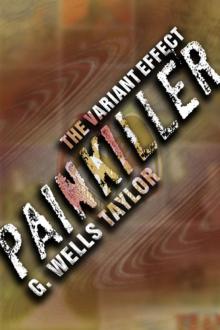 Painkiller
Painkiller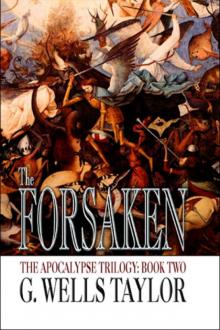 The Forsaken - The Apocalypse Trilogy: Book Two
The Forsaken - The Apocalypse Trilogy: Book Two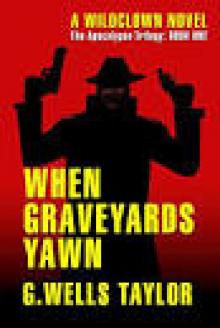 When Graveyards Yawn
When Graveyards Yawn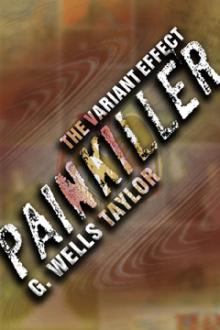 The Variant Effect: PAINKILLER
The Variant Effect: PAINKILLER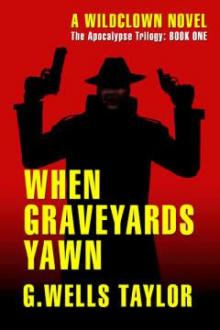 When Graveyards Yawn ta-1
When Graveyards Yawn ta-1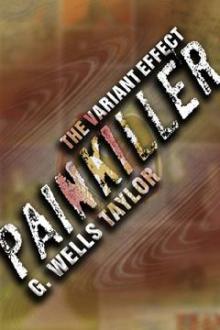 Painkiller tve-2
Painkiller tve-2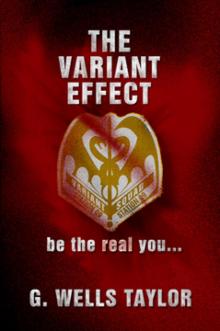 The Variant Effect
The Variant Effect